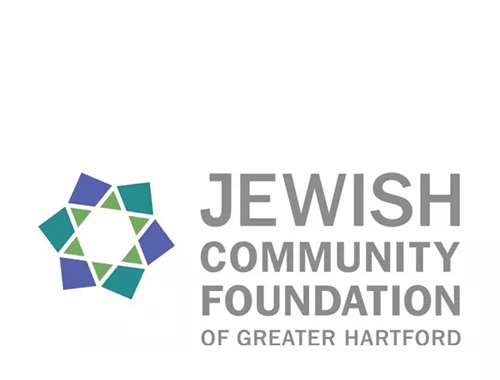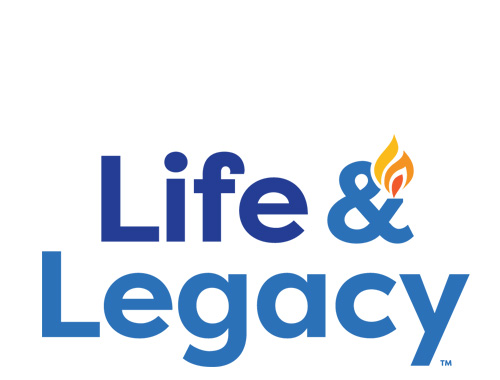Schechter Shavua: December 1, 2023
Fifth Graders Connect Tikkun Olam to the Environment at Teva
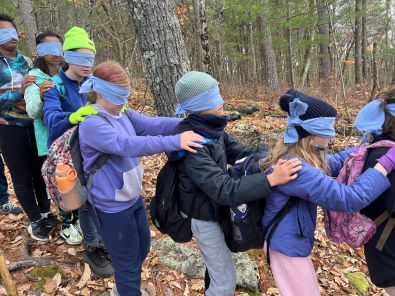 Schechter fifth graders of Nevatimwere excited to spend four days at Teva, a Jewish environmental and science program run by the staff of the Isabella Freedman Center in Falls Village, CT. Teva helps students explore the ecological wisdom inherent in Jewish Tradition while facilitating personal growth and community building. While learning and living in nature, our students not only got to unplug, but they also formed deeper connections to the Earth and fostered their commitment to tikkun olam – healing the world.
Schechter fifth graders of Nevatimwere excited to spend four days at Teva, a Jewish environmental and science program run by the staff of the Isabella Freedman Center in Falls Village, CT. Teva helps students explore the ecological wisdom inherent in Jewish Tradition while facilitating personal growth and community building. While learning and living in nature, our students not only got to unplug, but they also formed deeper connections to the Earth and fostered their commitment to tikkun olam – healing the world.
Throughout the four days, students took several hikes -- some easier, and some that were more “extreme” -- learned how to build a fire from materials found in nature, earned each others’ trust while hiking either while blindfolded or in the dark, sang songs and prayers, asked really good questions, learned about invasive specie, and most importantly, learned many ways that they could make the world a better place.
Middle School teachers Renana Ben Porat and Laurie Stanfield were thrilled at the way each student challenged themselves and kept a positive attitude.
Click HERE to see more photos of Teva Experiences!
Schechter’s Core Values Come to Life on Giving Tuesday
 Because three of our core values are Mitzvot (Jewish Practice), Lev Tov (Good Heart) and Kehillah(Community), Giving Tuesday is a big day at Schechter! Throughout the day, every student was engaged in activities to provide food, toiletries, or clothing to help people in need. Schechter has been honored to help Dignity Grows pack bags of toiletries for several years, however this year we are partnering with them so that when organizations come to collect toiletry totes, they can also collect snack bags, clothing, and meals for those in need through their organizations. The organizations are:
Because three of our core values are Mitzvot (Jewish Practice), Lev Tov (Good Heart) and Kehillah(Community), Giving Tuesday is a big day at Schechter! Throughout the day, every student was engaged in activities to provide food, toiletries, or clothing to help people in need. Schechter has been honored to help Dignity Grows pack bags of toiletries for several years, however this year we are partnering with them so that when organizations come to collect toiletry totes, they can also collect snack bags, clothing, and meals for those in need through their organizations. The organizations are:
- Hartford Fire Department
- Bloomfield Public Libraries
- Hartford Hospital Auxiliary
- Everlasting Faith Ministries
- St. Francis Hospital
- Mercy Shelter
- Grace Church Soup Kitchen
Dignity Grows is an organization founded by Jessica Zachs, a Schechter alumni parent, former Schechter board co-President, and current board member. Dignity Grows provides individuals in need with essential personal hygiene products so they can attend school and work and participate in community life without interruption.
For more photos of Schechter students in action on Giving Tuesday, click HERE.
Schechter Faculty and Staff are Learners Too
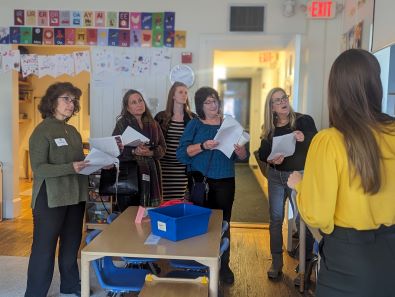 On Monday, while students had one extra day of Thanksgiving vacation, the staff was immersed in Professional Development.
On Monday, while students had one extra day of Thanksgiving vacation, the staff was immersed in Professional Development.
Most of the Early Childhood team drove to the Boston area, where they observed two outstanding Reggio Emilia -inspired schools and gained ideas and techniques for their own classrooms. This trip was a great refresher for our veteran teachers who had gone through formal Reggio training, and an invaluable immersion in greater depth into the Reggio-Emilia approach for our new EC teachers. This work stemmed from our commitment, expressed in our mission, to be a “joyful, challenging, and creative environment.”
The rest of our faculty—including two EC teachers, who will share what they learned with their colleagues—took part in three sessions:
- Anat Climor and the Ivritteam worked with the entire staff planning a special day in early January when we will be celebrating the Modern Hebrew language in fun and creative ways. Hebrew is a critical part of our education at Schechter, and is specifically highlighted in our Core Value of K’lal Yisrael (Unity of the Jewish People).
- We participated in a workshop with Keshet, a respected organization that helps Jewish institutions to become more mindfully inclusive of LGBTQ+ individuals. As a school, we have always aimed to be inclusive, based on our Core Value ofLev Tov(Good Heart), which calls on us to “treat all human beings with respect.” Keshet’s outstanding presentation helps us understand the importance of listening, consider the profound impact of our practices and language on our students, and create a space and a culture where students feel like they fully belong. Since many Schechter staff have previously trained with Keshet, no major initiatives are needed, but this training provided small but powerful ways to be more inclusive.
- Lastly, faculty had an Anti-Bias Training workshop with educators from the ADL . Teachers reflected on their own experience with biases and discussed the effects of implicit bias. We discussed how to talk about bias in age-appropriate ways with our students and how bias impacts us in the Jewish community in light of current events. Our Core Value of Chochmah(Wisdom), which speaks of “considering multiple perspectives with empathy,” was manifest throughout this session.
Over the summer, our teachers and middle schoolers read a book about the movement for disability rights that culminated in the Americans with Disabilities Act. On MLK Day, this summer reading, along with some of our PD conversations, will guide some schoolwide work on inclusivity.
Many thanks to Sarah Montag, Robin Werner, and Anat Climor for planning a powerful, productive day of continued growth. We look forward to sharing in future articles the ways in which these trainings and experiences impact the Schechter community.
Parashat Vayishlah—The name “Yisrael” and how we treat people
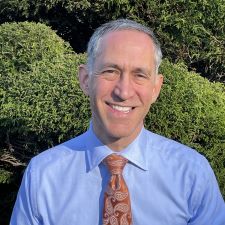 In this week’s parashah , we read the story of Jacob wrestling with a mysterious angel. Twenty years earlier, Jacob had deceived his father Isaac, stolen a blessing from his brother Esau, and fled; he hadn’t seen his brother since. The night before he is to meet Esau, Jacob encounters and grapples with a divine being. He leaves with a weakened body but a strengthened spirit, symbolized by the new name, Yisrael, he receives from the angel. His original name “Jacob,” from the word for heel, reminds us of his status as the weaker twin who grasped at the heel of his older and stronger brother while they were still in the womb. The name “Israel” indicates physical and spiritual strength; it’s usually interpreted to mean “the one who struggled with God.”
In this week’s parashah , we read the story of Jacob wrestling with a mysterious angel. Twenty years earlier, Jacob had deceived his father Isaac, stolen a blessing from his brother Esau, and fled; he hadn’t seen his brother since. The night before he is to meet Esau, Jacob encounters and grapples with a divine being. He leaves with a weakened body but a strengthened spirit, symbolized by the new name, Yisrael, he receives from the angel. His original name “Jacob,” from the word for heel, reminds us of his status as the weaker twin who grasped at the heel of his older and stronger brother while they were still in the womb. The name “Israel” indicates physical and spiritual strength; it’s usually interpreted to mean “the one who struggled with God.”
But Rav Nachman of Bratslav, in his commentary Kedushat Levi, offers a different and intriguing interpretation of the two names. He notes that the name Yisrael is granted because Jacob “strove with God and human beings , and prevailed.” Some of us, says Rav Nachman, only have God in mind when praying and studying—but when interacting with fellow human beings, we forget about their God-given human dignity, and treat them poorly. When we do this, we are called “Ya’akov.” He bases this on a fanciful parsing of the name Ya’akov; the initial yudstands for God, and the letters ‘akov can mean “to cancel.”
But ideally, Rav Nachman seems to say, we have God in mind at all times—both when talking to God, and when talking to other people. When we treat others with deep respect, as beings created in God’s image, we are called “Yisrael.” He bases this on a fanciful parsing of Yisrael as Yashar El, or “straight/honest with God.” In other words, according to Rav Nachman, Jacob earned his “Israel” stripes by learning to treat peoplewell. What a wonderful take on the change in names!
May we always merit the name Israel—by acting in a holy manner in all of our interactions, treating everyone we meet with respect, and recognizing that everyone is created in God’s image.
Shabbat shalom,
Rabbi Jonathan Berger
Head of School
Questions for the Shabbat table:
- Compare how young Jacob treated people and God. In your opinion, did he treat them differently, or similarly? Was the angel’s blessing a reward for past behavior, or did it express a hope for future behavior?
- When is it hardest for you to remember that another person is one of God’s creations, and in God’s image?
Solomon Schechter Day School
of Greater Hartford
26 Buena Vista Road
West Hartford, CT 06107
© Solomon Schechter Day School of Greater Hartford | Site design Knowles Kreative

